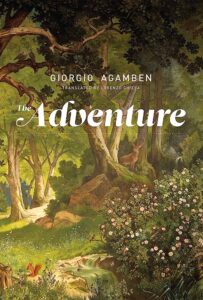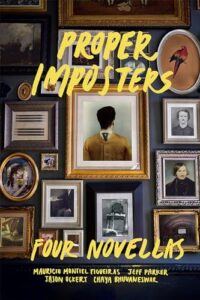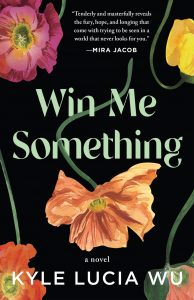Nonfiction. 104 pgs. MIT Press. March 2018. 9780262037594.
The fact that the term [adventure]—crucial to the chivalric tradition to which the love poets were so familiar—does not appear in more than fifteen thousand verses of the Divine Comedy betrays something like a positive intention.[1]
Today I found myself thinking about The Adventure by Giorgio Agamben, a philosophical, etymological history of the concept of adventure. I had not been reading it—for I read it when it first came out in English in 2018—rather, I keep thinking of this supercharged little book (only 91 pages) as I make my way through Don Quixote.
There are a number of ways that these two texts seem to throw each other into strong relief. One example: In Don Quixote, we of course have our knight errant who devotes himself to a life of adventure on the basis of what he has read, on the basis of the world- and mind-overwhelming nature of language. But in Agamben’s book, we have no flesh-and-blood character sallying forth out of such a chaos of words, but instead the word itself, adventure or aventure, breaking out from a morass of text, writers of adventures and chivalric romances, lais and tales.
What occurred to me specifically—I was reading the beginning of Part II of Don Quixote—is that neither Cervantes nor Don Quixote are mentioned even once in The Adventure. As is analogously indicated by the above epigraph, this is a rather large—I would imagine deliberate—omission. Goethe and his Demon, Eschenbach and Parzifal, Lanval and Marie de France, even Deleuze, and Jacob Grimm all make their way into the text, among others, but the knight of the rueful, sad, sorry, sorrowful, woeful, or mournful countenance or face (depending on your translation), is nowhere to be found, though I remember expecting him, while I tore through The Adventure, to burst through the door at any moment. And in the same way, though with less justification, I read Don Quixote half-expecting the hero to have a sympathetic “intelligent conversation worth knowing about” with a 16th-century Giorgio Agamben.
The thread connecting these two works, admittedly different in basically every sense, is their conception of adventure. For Agamben, adventure is a form-of-life that welds life and language together irrevocably—and this is just what adventure is for Don Quixote, though here I will not go so far as to say that this is Don Quixote’s, the book’s position, nor that of Cervantes. This goes some way toward accounting for the omission of Don Quixote in The Adventure, because to an admirable and exemplary extent Agamben himself is identified with him in his book.
What Don Quixote gives us in total narrative joy, The Adventure gives us in bright philological concentration: Both create a sense of wonder, the beginning of all serious thought. The committed (in both senses of the word) or aspiring cervantista[2] should read The Adventure like a cipher. The true histories and exploits of knights and their squires will never be the same after one has done so.
[1] Giorgio Agamben. The Adventure. MIT Press. 60.
[2] This is a term from Joshua Dienstag’s book, Pessimism: Philosophy, Ethic, Spirit (Princeton University Press. 205). “Don Quixote represents what I am terming a ‘practice of pessimism,’ a mode of conduct and action founded on an absence of expectation and hope. Cervantes is not a Nietzschean; can we understand Nietzsche as a cervantista?”
The Adventure is available through MIT Press. Purchase it now through their website.
Like what you’re reading?
Get new stories or poetry sent to your inbox. Drop your email below to start >>>
NEW book release
Ghosts Caught on Film by Barrett Bowlin. Order the book of which Dan Chaon calls “a thrilling first collection that marks a beginning for a major talent.”
GET THE BOOK



